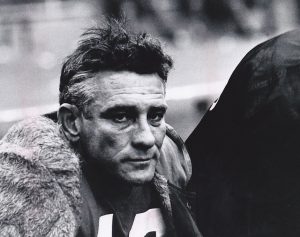Memorial Day: A reminder of how young they were…
Posted on: June 01,2016

Rick Cleveland
This is written on Memorial Day morning, the morning after it was announced that both Ole Miss and Mississippi State baseball teams will host NCAA Regionals at once for the first time ever.
It is written on the day after Southern Miss’s stirring 3-2 victory over tradition-rich Rice for the Conference USA Baseball Championship. Has a relay play from the outfield ever been executed more perfectly? I think not.
This is written on a day when we Americans take a day off from work to remember those who sacrificed to keep us free.
We should never forget that most Americans who sacrificed their lives in all the wars were the same ages as the centerfielder, shortstop, first baseman and catcher who executed the perfect 8-6-3-2 relay for the final out of that championship victory in Hattiesburg Sunday. They were kids, forced to grow up fast — and hundreds upon hundreds of thousands never got to finish growing up.
We owe them everything.
That’s all. Everything.

Charlie “Roach” Conerly
The late Charlie “Roach” Conerly, from Clarksdale, was a football and baseball star at Ole Miss in 1941, having just finished his freshman season when the Japanese bombed Pearl Harbor. Not long after, Conerly volunteered for the Marines.
A year later, he was on a ship headed for Guadacanal and the Pacific theatre for some of them most intense, bloody fighting of World War II.
I once talked to Conerly and two of his fellow Marines, Paul Fugate and Miller Dent, about the fighting.
What Conerly said will tell you much about one of Mississippi’s most humble sports and war heroes. “I was lucky not to be killed,” Conerly said. “I didn’t want to go and I was lucky to be able to come back.”
That was Conerly, a many of few words, and none more than necessary about himself.
His two buddies said far more.
Fugate told about one day when all three were on patrol in Guam.
“We were in a mortar platoon,” Fugate said. “One day we were out on a seven-man patrol, and Roach was the point man. He had two guns shot out of his hands that day and he just kept on going. He knew what his job was and he went out and did it.”
Dent went further.
“I don’t know exactly how to say it but Roach was like a magnet,” he said. “Roach was a natural leader. You just felt safe as long as you were around him. You felt as long as you were around him, you would be safe.”
Somehow, all three made it back. So many did not. Roach Conerly not only led Ole Miss to its first SEC football championship in 1947 but also led the Rebel baseball team in hitting with a .467 average. He could have played either professional football or baseball. He chose the former. And he was just as modest about his football greatness as he was his bravery in war.

Gov. Winter
Earlier last week, Gov. William Winter talked about Conerly’s greatness as wedrove to and from Cleveland for the C Spire Ferriss Trophy banquet. Winter covered Conerly as the editor of the Mississippian at Ole Miss and much admired him.
During the conversation, Gov. Winter, also a World War II veteran, told me that both his predecessor, Frazier Furr, and a successor, Joe Waggoner, as the Mississippian’s editor were killed in that war. Three student body presidents from Winter’s last two years of college — Gus Gerard, Billy Sam and Herman Baxter — also were all killed in action. They had their whole lives in front of them. And then they didn’t.
We remember them especially on Memorial Day. But we should never forget them.



